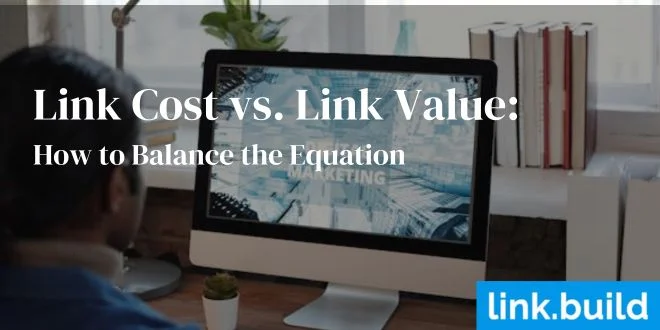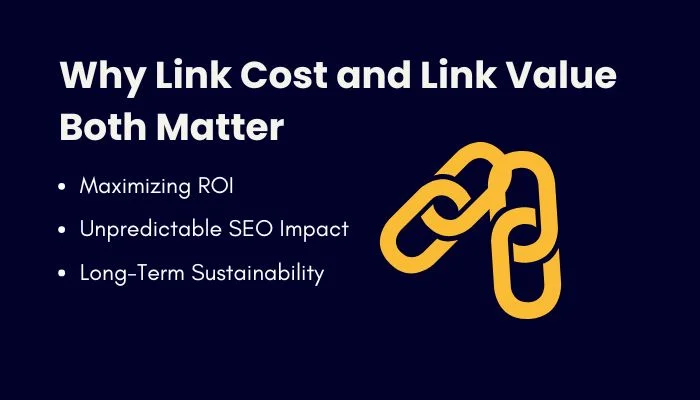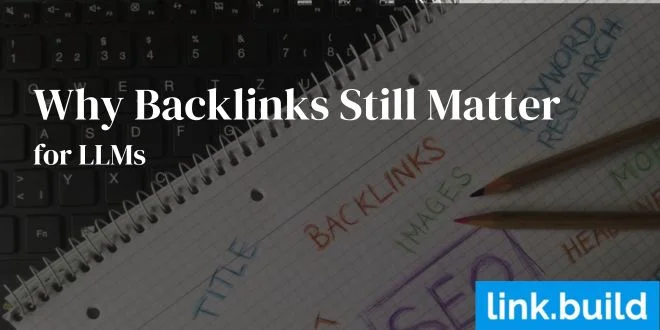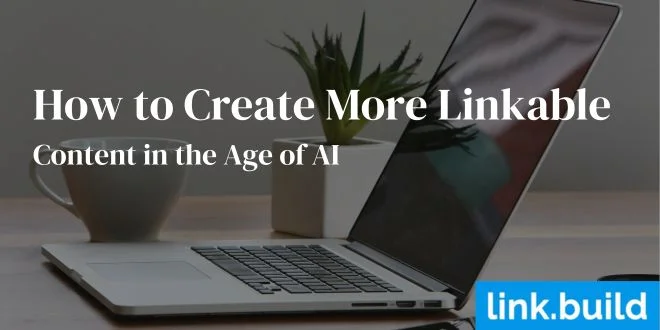Link Cost vs. Link Value: How to Balance the Equation

Link building should, hypothetically, provide a solid return on investment (ROI).
You spend money and time building links.
Those links pass authority to your website.
That authority increases your website's rankings in search engines.
And ultimately, you end up with more traffic and more sales.
The key word in our first sentence was “hypothetically,” because as any experienced link builder can tell you, this equation doesn't always flow so smoothly.
If you want to be successful in link building, and SEO more broadly, it's important for you to consider both link cost and link value.
So how do you do this? And how do you balance this equation in your favor?
Why Link Cost and Link Value Both Matter

It's tempting for link builders to focus on the potential authority or referral traffic of a link, ignoring everything else in the process. But if you want to get the best possible results, you need to think about both cost and value.
Essentially, this is a matter of return on investment (ROI). You need to make sure that you're getting more value from your links than you're spending in securing them.
Obviously, link cost and link value are not easy to calculate.
Google doesn't give you a guide to tell you exactly what a link is worth or how it's going to affect your search rankings. And on top of that, it's not always clear how much a link is going to cost you, or how long it's going to last.
There are a lot of unknown factors to contend with.
Even so, if you put a proactive effort into estimating costs and values to the best of your ability, you'll be in a much better position to tip the equation in your favor.
Evaluating Link Value
These are some of the most important things you'll need to consider as you evaluate the value of a potential link.
- Domain authority. Domain authority is arguably the most important factor you'll need to consider, as it's going to directly influence the power of your link in terms of its ability to pass authority to your site. The higher the authority of the referring source, the more valuable the link is. This also scales in an interesting way, with even slight differences at the top of the scale leading to a significant impact. Unfortunately though, this relationship isn't so well understood or well correlated that we can concretely estimate the value of a link based on the domain authority of a website. It's still only one factor that you'll need to consider for this part of the equation.
- Relevance. You'll also need to think about the relevance of the referring source, and for a couple of reasons. For starters, it seems that Google is more likely to interpret your link as relevant and natural when it's on a source related to your content. This is also an opportunity to optimize for specific keywords, phrases, and topics, which could increase the inherent value of the link you build. On top of that, highly relevant links are going to be easier to build and more sustainable, giving them lasting power in the context of your overall link profile.
- Referral traffic. Although your primary objective may be increasing your search engine rankings so you can generate more organic traffic, it's valuable to remember how beneficial referral traffic can be. If the referring domain has a lot of visibility and traffic, and your link is sufficiently enticing, it should be capable of generating significant referral traffic to your website. In some cases, this can greatly increase the overall value of the link.
- Internal linking opportunities. Different referring sources are going to present to you different content landscapes. Some of them are going to be more favorable for your internal content than others, so if there's a specific internal page that you want to promote, some sources are going to be more valuable than others. For example, if there's a piece of original research that you want to rank as highly as possible, a link on a relevant referring source is going to be more valuable than a link on an irrelevant referring source, even if the latter has a higher domain authority.
- Relationship benefits. Next, think about the potential relationship benefits that could come from you building this link. If your guest post is successful, will there be more opportunities to guest post with this publisher in the future? If you form a good relationship with the editors here, could they introduce you to editors at another source? Are these editors easy to work with and get along with? Obviously, you may not know all the answers to these questions before you publish your first piece.
- Reputational benefits. Are there any reputational benefits that you'll receive by being affiliated with this publisher or linking opportunity? For example, some publishers have powerful brand name recognition, and simply being featured on their website can be a massive benefit for your brand. Not every link building or publication opportunity is going to be similarly valuable in this respect.
- Fit with your link profile. Your backlink profile also matters overall. It's important to have links from a diverse array of different sources, and it's important to build a linked profile that gives you a competitive advantage. Sometimes, it's worth building a link simply because a competitor doesn't have it, or simply because it fills some significant gap in your current profile. This can push the value equation forward.
- Competitive considerations. It's also important to think about the potential competitive value, and the advantages you could gain by building this link. Is this a link that's unlikely to be built in parallel by your competitors? Does it give you some kind of distinctive advantage in your field?
Evaluating Link Costs
When it comes to evaluating link costs, you should think about both money and time.
On the money front, you'll need to consider:
- Agency costs. Are you paying for an SEO agency to help you with link building? If so, you'll naturally need to factor in the agency costs of building this link. Some agencies charge based on the links they build, while others bill by the hour or build a flat fee based on a collection of services, so it's not always easy to calculate this.
- Publisher costs. Sometimes, there will be costs associated with getting the link published. You may have to pay the publisher for the opportunity, spend money to make a donation, or spend money in other ways.
- Other costs. There could also be peripheral costs associated with your link building efforts, such as paying for a tool that makes it easier for you to research potential publishers. If you want to be as thorough as possible, you'll need to factor in all applicable costs.
On the time front, you'll need to consider:
- Research and vetting. Arguably the most time-intensive part of the process is in researching and vetting prospective publishers. To even speculate about the value of a prospective link, you must spend significant time learning about a publisher and coming to objective conclusions about what they can offer your brand. If you're building links on a big enough scale, this can take many hours of time.
- Pitching. Link outreach can be difficult, in part because the art of pitching is a challenging and uncertain one. You can spend hours researching the publisher and coming up with inspiration for a solid guest post, only to be rejected by an editor who's overwhelmed with queries. It's not always obvious how much time you're going to spend pitching, or whether or not that time is going to pay off. Accordingly, this is a very difficult part of the cost equation to estimate reliably.
- Drafting. Assuming your pitch is successful, you'll need to spend time drafting the initial content. This is a piece of the time equation that should be relatively easy to estimate, especially if you've written similar pieces of content before. Some variables can influence the amount of time it takes to write a piece, such as the length of the piece, how much research you need to do, and your current level of familiarity with the subject, but you should ultimately come to a reasonable, reliable conclusion.
- Editing. Some publishers will be willing to accept your first draft with minimal, if any edits. Others will be extraordinarily picky, requiring you to rewrite the entire piece or spend significant time researching new ideas and modifying your initial draft. If you have an existing relationship with a publisher, or if you know their reputation, you can estimate this. Otherwise, you're going to be in the dark.
- Follow-up. You may also need to factor in time for following up with your publishers. How much time and energy is it going to take for you to get an answer to your pitch, or get your final draft approved, or make sure that the approved piece is actually published with the link intact? For some publishers, this can take a lot of time.
- Maintenance. It's also a good idea to build in an estimate for ongoing link maintenance. Do you have a plan of action if your link is removed? Are you going to follow up to make sure your link remains intact and active?
Combining Your Estimates
When you combine all your value estimates and translate them into the total meaningful impact on your SEO strategy, you'll arrive at a firm conclusion about the hypothetical value of a given link.
When you combine all your cost estimates, you'll know how much that hypothetical link is going to cost you.
Unfortunately, you probably won't be able to pinpoint an exact dollar amount on either side of the equation. But you should be able to determine whether the time, money, and effort to build a given link is worth it.
The Bottom Line
You’re not going to be perfect at estimating link value or link cost.
Even if you were perfect, this wouldn't be the only considering factor in your SEO performance.
Even so, this is a valuable equation to keep in mind as you navigate the challenging and complex world of link building and SEO.
Thankfully, you don't need to navigate this world alone.
SEO experts, like our distinguished team members, are here to help businesses like yours rise in the rankings, gain visibility, and ultimately land more sales online.
Are you ready to start the conversation? So are we – so reach out today!


.svg)



